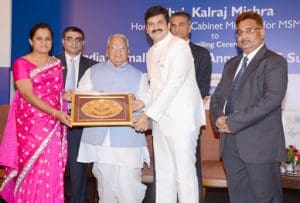As we all know the current pandemic going on across the globe which have had a huge impact on the textile industry. On the same concern, we asked companies and owners to share their views of how it had impacted their firm and how they deal with the situation.
Sudarshan Rajagopalan- Principal – Business navigation and innovation. VSM for sustainability in Medical Textiles

How are your business’s operations being impacted by COVID-19?
It is operational with a few alterations. We were core into liquid borne diseases but now we make coveralls to manage something that is quasi air-borne with the fabrics modified as per the prescribed norms. However, too much of chaos, noisy arrivals of many new operators who are first timers only with money to sieze opportunity to make money.
Our realisation it does not matter how much of experience you have in the space and how many hours you have spent to develop the industry but if there is infrastructure or equipment or money as an infrastructure; only then you have a role to play.
Technical knowledge is only to know what the next step is for future and not the present. On the present it is only the vitamin Money that aids.
Hence the objective is to accrue the ability to build infrastructure and look for cheaper funds for the same. COVID19 is realisation for the insufficiency. Building for the insufficiency will be the objective.
Which ways have been implemented by you to keep connection with your customers and provide them service?
There are too many people who have entered the space. The existing customers and products are on hold since no surgeries are being conducted. What is operational is on a lean mode. However, when the normal work starts we will have to see how we can cope up with the deficit of raw materials (Escalated costs) and the too many people who will enter the space for the same share of market and the unpredictable direction of the industry and buyers tendencies. Everything looks ripped apart.
What measures has been implemented by your firm to overcome the scenario from your end?
We have shifted gears to provide for the market demand. We are sure the demand is momentary and we only try to identify the long term operators and process. Infrastructure, capacity and capability building will be the Mantra. The elevated infrastructure to match the next level of operations and compliance to standards and stringent norms with cheaper source of funds will be an objective.
What are your suggestions for government to consider for betterment of the industry and to handle the situation keeping in mind the textile/garment sector as it has been impacted to a great extent?
- This is no longer a Textile / Garment Sector we are in. It’s a multi-disciplinary industry. Policies / rules / regulation has to be framed with the benchmark standards.
- The norms for Medical Textiles are regulated by the medical terms. However, there is a lack of representation and understanding for Textiles and guidance to the regulatory authorities. The regulations are benchmarked by taking in EU / USA standards of operation assuming they have better standards. Standards have to objectively set with the Indian domain.
- Entrepreneurs are capable to achieve those standards by innovation. Innovations but need Grant Funding (Cheapest source of funds). Grants are routed though the Research Institute or academia. Money is absorbed by the receiver of such Grants. Entrepreneurs have only licence to begin his tough journey of commercialisation with Bank rate of Interests or subsidies which are like chasing a wild goose.
- Entrepreneur has a definition of problem and the potential solution. For a theoretical back up or verification/ validation of his idea; he looks for Grant funds. Grant Funding for innovation is never given the entrepreneur, who drives the business, knows the problem and the probable solution. He can drive to manoeuvre though to be successful. However his Grant funds are always thorough people disconnected with the market. Here in the present model he ends up sharing the IP with people in academia who were unaware of the problem or solution and become the custodian of the same along with the Grant funds. This government has to change to be more productive with the Grant funds for innovation.
- Entrepreneur loses further when his potent idea is licensed to many more though the academia. Entrepreneurs have only licence to begin his tough journey of commercialisation.
- Banks & Schemes under state and central are confusing. Reservations complicate matter and allotments of funds are unutilised. Many a times to ensure the funds are utilized; investments are made in a hurry in unproductive infrastructure which is unwieldy for an Entrepreneur to access. The Grant money is wasted in such cases. Will an Entrepreneur not be more prudent to use such funds?
- The above comments can be validated with the vulnerability seen in the COVID19 panic for PPEs and many other Medical essential supplies which are dependant only on one country.
- Banking / Financial institute should provide Medical Textiles under a PRIORITY SECTOR and provide the scope for easy funding.
- The Grant funding is never provided to industry directly; they trust the academia or research institutions and not a MSME registered / NSIC Certified organisation? They have schemes to recover money from the creditors and protect the entrepreneur then why a model to give the financial support where he wants it through a control model not envisaged?
Manoshi Kamdar – Aarainc.

About Aara inc
At Aara Inc., sustainability remains at the heart of all our work.
In order to reduce our carbon footprint, we are continually developing and using sustainable design and printing techniques. We are committed to reducing fabric wastage through smart design. We work with ethical manufacturing partners, and are committed to educating ourselves and our clients about sustainable practices at every stage of the design process.
Ultimately, what’s good for Mother Nature is always en vogue.
How are your business’s operations being impacted by COVID-19?
Like all, our operations have been affected. Delayed payments and canceled orders being the biggest. We had remote working provisions in place so that was a transition however, a lot of brands are buckling down and unwilling to plan future collections which have definitely impacted us.
Which ways have been implemented by you to keep a connection with your customers and provide the service?
As mentioned, we had work from home provisions in place so moving things virtual was easy. Additionally, a lot of our clients are abroad so it was easy to transition. We have been in constant contact with our clients ensuring that they have the required support through this tough time. Additionally, we have moved our print sales to our online shop and are offering video consults. We have also used our digital platforms to promote positivity and spread relevant information which has been helpful to a lot of brands.
What measures have been implemented by your firm to overcome the scenario from your end?
As we started entering lockdown we realised this wasn’t the time to pitch sales. We changed our strategy to brand building, providing relevant content and strategising for the future. We have made provisions to be able to provide most of our services digitally going forward. However, we had to eliminate a lot of external and marketing costs in order to sail through while we strategized for the future. There is a lot of uncertainty so it is quite difficult to establish a concrete way forward.
Saloni Sinha- Tarasha

About Tarasha:
Tarasha is a line of Handcrafted Accessories Brand.
Our range celebrates traditional craft techniques with a focus on timeless designs, thus aiming to provide a platform for skilled artisans to showcase their handwork.
Founder Saloni Sinha, a Post Graduate from London College of Fashion strongly supports Slow Fashion & truly believes in working at the grass root level, along with the artisans to create beautiful products using indigenous craft technology & locally sourced Raw Materials.
How are your business operations being impacted by COVID-19?
Through our online channels, we are open to orders but will be able to resume the dispatch services, once the lockdown is lifted and situation is under control. Since we are a craft based brand, most of our artisans are continuing working within the premises of their home for next season. Their safety is our utmost priority and I am glad that they are able to earn livelihoods while working from their home. This is a crucial time for all of us, I am using this time to learn more about the expected consumer shifts, planning & restructuring our business model.
Which ways have been implemented by you to keep a connection with your customers & provide the service?
We all are in a situation where everyone is spending so more time on their screens, and connecting through social media has become the new norm. At this time it is so much more crucial to maintain human connections than to just hard sell products. We are trying to curate photo series/ archives based on various themes, to remain positively connected to our customers.
In maintaining connections, transparency plays a crucial role at this point and providing information about our procedures at every level will be our goal.
What measures have been implemented by your firm to overcome the scenario from your end?
It’s really difficult to predict things now. We are constantly in touch with our artisans, keeping a check at their situation & trying to make them aware about the precautions from our end. We are working on our merchandise plan, with major focus on sustainability at all levels. We have stopped production of few product lines to avoid dead stock later.
On the front end, we are working with our delivery partners on providing contactless delivery & safe packaging.
What are your suggestions for the govt. to consider?
We do believe that the government & authorities are doing their best in terms of crisis response. Healthcare, Infrastructure, Distribution of Key Supplies needs to be reformed.
It will be great to see Government coming forward for the craft sector, which has already suffered losses due to cancellation of many events this year. Financial packages must cover the artisans & the government should provide interest free loans to the artisans. Crisis like these could force craftspeople to give up their crafts, and work in other industries to secure incomes. It is crucial to save Crafts because of the intangible Cultural Value they carry. Initiatives like bulk buying fabrics from artisans for making masks, and involving them in their capacity to overcome this crisis would be great, as this would keep their cash flows positive.
The biggest problem right now for everyone is to save lives without destroying livelihoods, for which we all as responsible citizens, must find ways to make the lockdown effective to help in containing the virus in a short time.

As an independent bespoke designer/ businesswoman I have built my business on strong one to one relationships with each and every one of my clients.
Since the onset of the COVID-19 pandemic, I am proud to say that I have been able to deepen that bond by keeping communication open and clear with my clients and providing any support I can. Since I am a one-woman business, I have been able to maintain sewing operations. Changes made were to cease in-person fittings but to offer FaceTime appointments for custom clothing inquiries, as well as providing video updates of dress progress to those clients whose work was already in process. My intent is to be rested and ready for the resurgence of sewing needs that undoubtedly will arise once society gets a chance to recoup.
I urge the government to consider just how seriously a small business wishes to comply not only to survive but to be of service to the public and the economy.

How are your business’s operations being impacted by COVID-19?
All of the member companies are in complete lockdown and everyone facing financial and payment issues .
Which ways have been implemented by you to keep connection with your customers and provide them service?
Our members are in constant touch with all the stakeholders including the customers Reg the orders in pipeline , payments and future plans while keeping the current COVID turbulence in mind.
What measures has been implemented by your firm to overcome the scenario from your end?
Engaging with customers to understand the happenings and also communicating continuously with all stakeholders including employees to keep the positivity .
What are your suggestions for government to consider for betterment of the industry and to handle the situation keeping in mind the textile/garment sector as it has been impacted to a great extent?
Reg Finance and Banking
1. Extend the moratorium period of all loan and interest payments to one year
2. Repackage the pending loans during moratorium period as two year term loans .
3. Offering 30 % Additional working capital limit to infuse liquidity and help the textile and apparel companies to re start the operations.
4. 3 % interest subvention for labour intensive sectors
5. Specific export incentive schemes for rhe entire value chain of textile products for a Two year period to I’m over our export competitiveness.
6. Adding yarn and fabrics in export incentive scheme to promote exports and help the companies to export the surplus production
7. Strategic plans to use the Post COVID opportunity to grow our textile and apparel exports
Manish Daga- Cotton Guru

About Cottonguru®
Only one thing is constant in the world, change. With ever fluctuating market and circumstances, it is vital that everyone involved in cotton trade remains updated.Following a model from farm to factory we build a tradition of trust. ” When It’s Cotton – It’s Us”
COTTONGURU® is the leader in cotton advisory services across the country. We are in cotton industry since 1903 and have strived hard to reach this leading position. Our vast experience of working with the smallest of farmers and top most consumers, DNA of technical and Marketing expertise and in house cotton testing laboratory has given us a clear edge over our competitors.
We will continue to contribute to the value addition of cotton in every possible manner.
KK Jain- Sanghvi’s Boutique

My suggestion to the government is that it should increase the lockdown. I have an online shopping business as a retailer. Pre Covid19 the business was working well but due to the pandemic, the business has been completely stopped. However, I keep myself connected with the customers. Hoping this situation will soon come to an end and the business goes back to normal.

